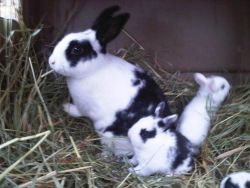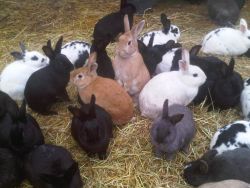NEWS RELEASE about Environment posted on February 8, 2011 by Roslyn Cassells
Year of the Rabbit brings new threats to rabbits at UVic and in BC
Action for UVic Rabbits year end report
This report and the attached photos may be copied, printed, shared or posted...in whole or part...if properly attributed.
Finished reading your horoscope? Done with the dim sum? It's the Year of the Rabbit and there are some real rabbits that need your attention!
Unless you've been living in a burrow, you'll have heard about the UVic rabbits and the "battle of the bunnies". Well it ain't over yet, people. Despite a successful relocation campaign, during which over 800 rabbits have been trapped, sterilized, and relocated to Ministry of Environment permitted sanctuaries, the University of Victoria plans to begin killing rabbits again. They say any rabbits left on campus after Feb. 28, 2011 will be trapped and "humanely killed"...this from the institution that decapitated and bludgeoned to death over 100 rabbits this past spring. ( http://communications.uvic.ca/rabbits/ )
Advocates are petitioning the university to continue placing the animals in sanctuaries. Sanctuaries are applying to extend their permits for this purpose. In any case, despite UVic's contention "the permits are running out" the earliest any of the permits expires is at the end of March 2011 (Laura Leah Shaw of TRACS for Texas Rabbits, and Sorelle Saidman of Rabbitats), with some permits ongoing (provincially permitted wildlife rescue centers including EARS). In addition, all costs for the rescue effort have been borne by the community. Any future trapping and killing of rabbits will come directly out of the taxpayer's pocket through the provincially funded integrated pest management budget.
A coalition of groups is also petitioning the Ministry of Environment to allow private landowners to place enclosed rabbit habitats on their land as a means of colony management without the current requirement for permits. All rabbits in the proposed "rabbitats" would be sterilized, and colonies are proposed to range in size from 6-60 animals. Due to antiquated legislation, under the Wildlife Act the MOE classifies all rabbits (including domestic European rabbits) as "wildlife" and animal rescue groups are required to undergo an onerous and expensive permitting procedure to help homeless rabbits. The necessity of acquiring a permit has created a bureaucratic and economic nightmare for resource-strapped animal rescue groups still reeling from provincial clawbacks to charity gaming grants that caused many rescue centers to close their doors or reduce their service levels.
The lack of regulatory control of the sale of fertile domestic rabbits in the province of British Columbia and in particular in the municipalities in the Greater Victoria Regional District has resulted in the irresponsible breeding and abandonment of rabbits and the attendant increased animal suffering. Nowhere has this been more evident than on the campus of the University of Victoria, the dumping ground for abandoned rabbits from surrounding communities. The lack of status of this gentle and fascinating species is exhibited time and time again by people who abandon their former pets without regard for the individual, their offspring, or their community. To date not a single person has been charged under any of the relevant laws for the abandonment of a former pet rabbit, despite provisions under the Prevention of Cruelty to Animals Act, the Wildlife Act, and the Criminal Code.
Absent from any significant efforts to resolve the situation of these defenceless creatures are the two regulatory bodies who could and should defend them. The British Columbia Society for the Protection of Animals, and the provincial Ministry of Environment have instead sat on their hands during this entire debate, ignoring the pleas of the citizens of this province, and the advocacy groups who, in the absence of any official interest, have taken up the cause of the animals. The BCSPCA is responsible for the enforcement of the Prevention of Cruelty to Animals Act ( http://www.bclaws.ca/EPLibraries/bclaws_new/document/ID/freeside/00_9637... ), yet the unspeakable cruelties that rabbits suffer is rarely acted upon, and certainly not applied to groups of rabbits being killed for "rabbit management". They refer to these rabbits as "feral rabbits" even though they are without doubt abandoned pet domestic European rabbits. To call the UVic rabbits "feral" is a misnomer...wave a carrot and they practically knock you over (BCSPCA on feral rabbits: http://www.spca.bc.ca/assets/documents/welfare/position-statements/feral... ).
The BCSPCA discredited themselves again when they reaffirming their support of the planned killing of abandoned domestic rabbits by UVic. In fact, their website has links to the American Veterinary Medical Association killing methods they endorse, which include such ghastly practices as beheading, strangling, beating to death, and gassing. If the BCSPCA enforced the Prevention of Cruelty to Animals Act, which is their responsibility, the rabbits would have a powerful advocate. Instead the association has turned its back on these animals, among others. (BCSPCA approved killing methods: http://www.avma.org/issues/animal_welfare/euthanasia.pdf ). The BCSPCA website crows about the "hundreds" of rabbits they took into their shelters, and ignores the thousands they turned away or killed. Supposed wildlife rescue center Wild Ark, a subsidiary of the BCSPCA, often refuses to take baby rabbits, or takes them and unbeknownst to the public, kills healthy young rabbits in a back room. Such is the duplicitous face of animal welfare in BC.
Although the Wildlife Act and information sheets on the Ministry of Environment would lead to believe otherwise, in practice, the Ministry of Environment often refers people to exterminators if they have a "rabbit problem", a misnomer indeed and a stance of blaming the victim...instead of dealing with the root societal causes, or suggesting non-lethal exclusion methods. There are even ministry numbers you can call to listen to recordings that list the hunters, trappers, and exterminators in your neck of the woods, should you wish to kill wildlife on your property. In this day and age, education and promotion of sustainable, humane, non-lethal methods of rabbit control should be the central focus, not a knee-jerk redneck attitude towards defenceless animals.
The ministry had a perfect opportunity to correct matters for rabbits and other animals when amendments to the Wildlife Act (which it enforces) were being proposed a few years ago. A simple change, taking the domestic European rabbit off the list of "wildlife" was all that was asked by advocates. This would have allowed rabbit rescue groups to capture, sterilize, and rehome abandoned pet rabbits. The current law does not permit adoption (which incurrs significant longterm costs), and the procedure to establish a sanctuary is onerous and expensive. Despite the pleas of rabbit advocacy groups there were no changes to the Wildlife Act with respect to domestic rabbits.
The domestic rabbit is currently, at least on paper, to some extent "protected" under the Wildlife Act, but the ministry has never brought charges against anyone for violations of the Act pertaining to rabbits. There have been many instances when the Wildlife Act could have been applied to help the animals, yet it never has been. Rabbits in this province have been subjected to terrible cruelties due to the lack of political will of the responsible institutions and those who neglect and abandon their former pets. (lWildlife Act: http://www.bclaws.ca/EPLibraries/bclaws_new/document/ID/freeside/26_340_82 )
A microcosm of the plight of rabbits province-wide, the battle for the lives of the rabbits living at the University of Victoria, came to a head in 2010 after decades of the UVic administration ordering the killing of the campus rabbits on the sly during study breaks. UVic initially used animal researcher Michelle Martin as their advisor for the campus rabbits. She of course recommended they be killed. Then the university commissioned a report from exterminators LGL Environmental Consultants Ltd., who recommended a nightime shooting spree. The BCSPCA has twice sided with the administration in advocating killing the rabbits, and the Ministry of Environment has stood by and recommended legal methods of killing...kind of like the BCSPCA. Considering the odds, it's amazing that any rabbits made it off campus alive.
The periodic slaughtering of the abandoned rabbits was combined with the ongoing use of bromadiolone poison which effects the baby rabbits who can access the poison boxes, as well as any other small wild animals and birds, and any predator who eats them. Bromadiolone is an anticoagulant poison ten times more lethal than warfarin and know to have serious lethal effects on wildlife in both primary and secondary poisoning. In 2006 Health Canada's Pest Management Regulatory Agency issued a new regulation banning the use of this toxin and many others in outside areas accessible to wildlife ( http://dsp-psd.pwgsc.gc.ca/Collection/H113-12-2006-11E.pdf ). Despite the availability of non-lethal exclusion and management methods, UVic continues to fund its use, and has taken no action against those who snare rabbits on campus, nor those who abandon them either.
A constant public information campaign, protests (including one this Wednesday organized by a coalition of animal groups), ( http://www.thevictoriavegan.com/foa/files/UVic-Rabbit-March.pdf ), establishment of sanctuaries, a large spay/neuter grant from Furbearer Defenders ( http://furbearerdefenders.com/blog/july-2010-archives/14-fbd-saves-uvic-... ), the threat of an international boycott of UVic, and ultimately a challenge in the BC Supreme Court ( http://www.rabbitadvocacy.com/pdf_files/UVic%20Rabbit%20Injunction%20Jud... ) convinced the university to allow the rabbits to go to permitted sanctuaries, at least for a time.
During this brief period over 800 rabbits were removed from UVic with around 600 rabbits relocated to EARS sanctuaries on Vancouver Island ( www.earthanimalrights.org ), and the remainder to TRACS for UVic Buns ( http://tracs-bc.ca/uvicbun.html) who went to a Gig Harbour, Washington refuge ( http://rabbithaven.org/ ) and the Wild Rose Rescue Ranch in Texas ( http://www.wildroserescueranch.com/index.htm ), and the Rabbitats group - for eventual placement in Washington ( http://uvicrabbitrescue.com/ ).
Despite information campaigns, petitions and the public outcry against lethal methods of population control, there were no public policy changes to deal with the issue on Vancouver Island, where the situation for rabbits is most dire. Responsible institutions remained inert. Municipalities in the Greater Victoria Regional District have been notable in their lack of policy development or bylaws to halt the influx of fertile rabbits into their communities, and by their abdication of responsibility in this matter. The City of Victoria recently amended their animal control bylaw but made no changes for rabbits, despite intense public pressure. (see Jan 21 2011 entry on: http://blog.thevictoriavegan.com/ ) The reality is, trapping and killing of the rabbits goes on quietly in many municipalities and districts, and taxpayers' dollars are used to cruelly end the lives of these gentle creatures out of public view.
Fortunately for rabbits elsewhere in the province, municipal politicians were taking note of events on the island and in their own communities and progressive bylaws for rabbits were passing in many municipalities in the lower mainland, Kelowna and elsewhere. Provincially, Vancouver Island's South Saanich MLA Lana Popham bandied about a private members bill to stop the sale of fertile rabbits in pet stores in the province, but it went nowhere, due to lack of political will. National and international animal welfare groups took an active interest in the plight of the rabbits, contacting university officials and other community leaders. The local, national, and international media has focused attention on the treatment of the campus rabbits by UVic. Alumni and donors withheld their donations, students threw out their application papers or refused to register, refusing to continue studying at such an outmoded institution. Support groups for the rabbits sprung up everywhere. Facebook groups appeared, in many languages, all with a similar focus.
In the meantime other unnecessary and scientifically outmoded practices result in cruelties being done to rabbits at UVic, behind closed doors, and under the guise of "education" and "research." Tens of thousands of rabbits suffer and die every year in animal research in BC. Among other cruelties, the University of Victoria uses rabbits and other animals in biowarfare experiments on tularemia. UVic's professor Francis Nano started this research around 20 years ago after receiving a $500,000 grant from the US military. He then infected 500 rabbits with the disease and watching them die slow painful deaths. UVic and other animal abusers like the University of British Columbia (where over 100,000 animals die in labs each year) refuse to share research details with the public, despite the fact they are publicly funded institutions. A vocal group called Stop UBC Animal Research is making inroads on this issue ( http://stopubcanimalresearch.org/ ). At UVic, inquiries about animal research are ignored and the interested parties are referred to the UVic Communications Department.
Rabbit Advocacy of BC reports that the rabbit meat and fur industry in BC and elsewhere perpetuates tremendous suffering of rabbits and other animals, all behind closed doors and without regulation ( http://www.rabbitadvocacy.com/no_laws_to_protect_canadian_live.htm ). This results in horrific fear and pain during slaughter, and inhumane conditions ( http://www.rabbitadvocacy.com/breeding_facility.htm ) in many rabbit meat and fur farms. Similarly unregulated, the pet rabbit industry ( http://www.rabbitadvocacy.com/rabbit_advocacy_group_of_bc.htm ), often one and the same as the meat and fur industry, views rabbits as a saleable commodity not as individuals. As with breeders of other animals, babies with the "wrong colour" or "wrong features" are often left to die, starved to death, gassed, or strangled. Life is cheap if you're born a rabbit, in Canada about $4 a pound ($10 a kilo). Slaughter often occurs without loss of consciousness and in horrific conditions ( http://www.rabbitadvocacy.com/meat_rabbits_and_some_statistics.htm). There are no plans at any level of government for change in legislation in the near future.
When sustainable non-lethal humane solutions to rabbit management and animal experimentation are available, the suffering and killing of these animals is not only unnecessary, it is morally and ethically unacceptable. With respect to rabbit management, the Greater Victoria Regional District's municipalities can take positive progressive action instead of hiring trappers to kill the rabbits. And If UVic starts to kill rabbits again at the end of February as they have stated, they will simply be revictimizing the victims, not working towards a solution to what is clearly a human caused societal issue, not a "rabbit problem". The BCSPCA and the Ministry of Environment owe a duty of care towards the rabbits and the community. They must follow their mandate, do everything in their power, including enforcing their respective Acts, to provide a positive solution to what is ultimately a human problem.
If the BCSPCA and the Ministry of Environment do not do their duty to the animals, this will undoubtably become an issue in the next provincial election. Provincial politicians have received letters, reports, and press releases on this matter for many years and yet few have taken an interest in the plight of the rabbits or other animals impacted by the lack of action of the two provincial bodies responsible for their welfare (the BCSPCA and the MOE). Both institutions receive provincial tax dollars, and the BCSPCA receives money from some municipalites for "animal control" contracts in cities that have not yet adopted the "no-kill" best-practises model. While animals cannot yet vote, people who care about them certainly can...and concern for animals is increasingly becoming a pivotal point in the election of politicians worldwide. Ignore them at your peril, political and spiritual.
Roslyn Cassells
founder Action for UVic Rabbits
petitioner for the rabbits in BC Supreme Court
For the most updated information on the UVic rabbits visit the Action for UVic Rabbits facebook:http://www.facebook.com/group.php?gid=114989635192281&ref=ts
or join the email update list by sending a request to roslyncassells@yahoo.ca
attached photos courtesy of Susan Vickery of EARS sanctuary
The site for the Vancouver local of The Media Co-op has been archived and will no longer be updated. Please visit the main Media Co-op website to learn more about the organization.


